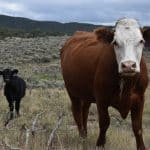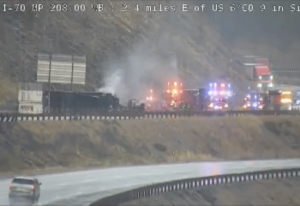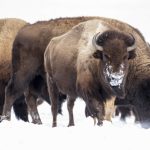Colorado’s state veterinarian is warning producers about emerging disease concerns
Colorado Department of Agriculture recommends vigilance for livestock, poultry owners in the face of new world screwworm and avian influenza

Post Independent archives
The Colorado Department of Agriculture and state veterinarian issued a warning for livestock and poultry owners on Thursday as concerns around New World screwworm and Highly Pathogenic avian influenza grow.
The state agency is asking producers to monitor their animals for signs of both diseases, which could have significant and widespread consequences in Colorado.
New world screwworm inches closer to U.S.
New World screwworm is a type of parasitic fly larva that feeds on living tissue and can cause extensive and potentially life-threatening tissue damage to affected animals, according to the state agency. While there have been no cases in the United States, recent detections of the disease in cattle near the Texas border in Mexico have prompted the Colorado Department of Agriculture to begin prevention efforts.
“We still have not had — knock on wood — screwworm detection in the U.S., and we’re doing everything we can to avoid that scenario,” said Kate Greenberg, Colorado’s commissioner of agriculture, at the Oct. 9 Colorado Parks and Wildlife Commissioners meeting.
This includes preparing a comprehensive New World screwworm response plan for Colorado and other coordination, according to Dr. Maggie Baldwin, Colorado state veterinarian.
“We are prepared to coordinate with local, state and federal agencies to implement measures such as quarantine, treatment, movement restrictions and sterile insect technique if a case is detected,” Baldwin said in a news release.
Veterinarians are asked to contact the state veterinarian’s office immediately if they suspect a case of screwworm. Baldwin specifically advised inspecting animals traveling internationally, carefully documenting suspected myiasis infestations with photos and videos, recording travel history and saving larvae for testing in 70% ethanol or isopropyl alcohol.
“The fact that it’s about 70 miles from the U.S. border is not a good sign,” Greenberg said. “The (U.S. Department of Agriculture) continues to keep the border closed to live cattle imports out of Mexico into the U.S., which, of course, is putting a ton of pressure on Mexican cattle growers.”
High path avian influenza stages a comeback
High path avian influenza has been a concern among domestic and wild birds since 2022, when it was detected in a commercial U.S. flock.
It has impacted nearly 10 million domestic birds in Colorado since 2022 and 127 million nationwide, according to the state’s Department of Agriculture.
Colorado had a spike in outbreaks last summer, with confirmed cases in poultry, dairy cattle and humans.
This year, the state has not seen domestic poultry detections since March; however, there have been multiple detections of high path avian influenza in wild birds across Colorado this fall. This includes detections in an owl, three turkey vultures and two red-tailed hawks in Larimer, Weld and Gunnison counties, according to the state’s agriculture and wildlife agencies.
According to a press release, the wild bird cases indicate the virus is “circulating in the central flyway.”
“We are seeing an uptick in (high path avian influenza) cases, especially in the Midwest,” Greenberg said at the October Parks and Wildlife meeting. “That does happen seasonally, which is historically how high path avian influenza travels, with the wild bird migration. But of course, this past year and a half of the outbreak, we’ve seen it behave quite differently, including last year’s spread into lactating dairy cattle. So we continue to monitor that.”
The Colorado Department of Agriculture reminded poultry owners that implementation of strict biosecurity measures — such as sanitation, monitoring and isolation protocols — will help protect flocks during this migration season.
Avian flu cases in Colorado poultry, dairy cattle or other livestock species must also be reported directly to the State Veterinarian’s Office, the agency stated. Suspected feline cases can be reported to the Colorado Department of Public Health and Environment, and they will share that information with the state Department of Agriculture.
“A delay in reporting can lead to a delay in necessary response measures, which can compromise human and animal health,” the state agency warned.

Support Local Journalism

Support Local Journalism
Readers around Glenwood Springs and Garfield County make the Post Independent’s work possible. Your financial contribution supports our efforts to deliver quality, locally relevant journalism.
Now more than ever, your support is critical to help us keep our community informed about the evolving coronavirus pandemic and the impact it is having locally. Every contribution, however large or small, will make a difference.
Each donation will be used exclusively for the development and creation of increased news coverage.










